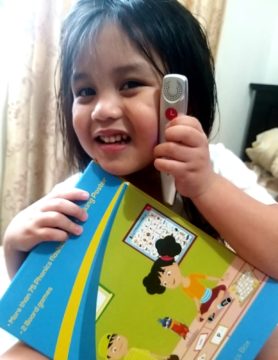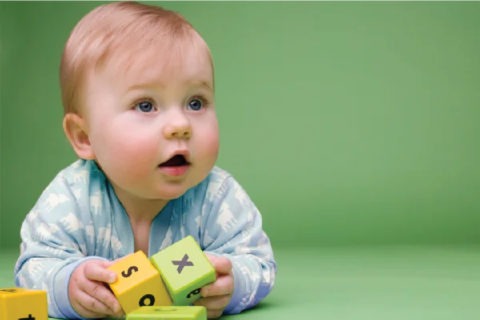
Improving Sleep for Babies
April 11, 2022
Understanding Your Child Better
June 28, 2022Linguistic development is a vital part of child development, and it’s critical we look at how you can encourage your child to communicate. The first three years of life, when the brain is developing and maturing, is the most important period for acquiring speech and language skills.
Talking, communicating, understanding, and speaking to others is an essential life skill. Having the ability to communicate helps children make friends, understand others around them, and improve their overall quality of life in addition to numerous benefits that good communication skills bring with it.
Speech, language, and communication are critical and absolutely essential areas of development for children. These are areas that play a vital role throughout our lives on a day-to-day level, helping us understand and rationalize the world around us, and communicate our basic needs, wants and feelings. It also helps in holding conversations, think and learn from others around us, develop relationships, and solve problems.
Having strong and good linguistic abilities will play a part in the support of other aspects of child development such as social, development, and cognitive development. The primary components of speech and linguistic development are as follows:
- Phonetics & Phonology: It is the ability to pronounce and properly articulate speech sounds and words, as well as having an understanding of the rules regarding the sound sequences and patterns in the respective language.
- Semantics: It is the understanding and learning of vocabulary and how their concepts map onto words.
- Syntax & Morphology: These are the rules regarding the arrangement of words in sentences.
- Pragmatics: It is the learning of social rules and norms that come with learning a language, including adapting your language depending on whom you’re speaking to and where you are.

As you can see, learning and speaking a language is not an easy undertaking; rather it can be quite complicated. But the good news is that children are programmed to be able to learn languages, especially in their early developmental years! What they need is support and input from their parents. Parents play a critical role in their children’s linguistic development. Several studies and research have shown that parents who read and speak to their children a great deal during their early childhood years will have a positive impact on their vocabulary and a better grasp on their grammatical skill than those parents who don’t!
Listed below are some simple and easy ways that you can nurture, develop and improve your child’s language development:
- Talk to Your Child: The best way to help develop your child’s linguistic skills and abilities is a rather simple method, and that is to talk to your child! Talk to your child as much as you can. Children are like sponges; they tend to absorb all sorts of information and knowledge from their surroundings and the environment around them. So, when you talk to them, they will learn by listening and repeating what they hear from you! For example, you could narrate the day as it goes on and explain to them in detail about the many aspects of their day-to-day life.

- Read to Your Child: It is never too early or too late to begin reading to your child. Reading to your child is one way to vastly improve and impact their reading and linguistic ability and skills. A good place to start is board books, from which parents can work their way up to picture books, and longer stories as the child’s reading ability grows and improves over the course of time. Even attending reading sessions at the local library or bookstore can also help your child develop a love for books and reading. Keep children’s question-and-answer books accessible in the child’s room. When the child asks questions, take them to these books and say, “Let’s find out”.
- Listen to Music Together: Children love and are drawn to music. This gives parents the opportunity to teach their children about the world around them, in addition to the growth and development of their linguistic skills and abilities through the art of music. You can sing to them as well!
- Tell Them Stories: Tell your children stories, make up your own stories – with characters, conflict, adventure, and morals. Telling your children stories that you make up lets you tailor the story to best fit your child and can also fuel your child’s curiosity and imagination. Be sure that the stories you make up fit the interests of your child.
- Let Your Child Take the Lead: If your child has an interest in a particular area or hobby, talk to them about it and encourage them to talk about it, express their thoughts. If they seem intrigued by ships and boats, teach them more about it and take a further interest in their interests. Ask questions and interact with them in regard to their interest.
- Never Criticize your Child’s Linguistic and Speech Abilities: Never criticize your child’s speech patterns and articulation. Instead you could repeat the statement or sentence they said back to them with the correct pronunciation. And praise them for their efforts.
- Use Computers and Screens Sparingly: Pediatricians recommend that children around two years of age should not watch more than 2 hours of quality programming a day. Apart from some quality educational programs, TV shows do not interact or respond to children, which are the two catalysts kids need to learn language. Computer games are interactive, but definitely not responsive to a child’s needs.
8. Go on Field Trips: Take a trip to the park, the zoo, the aquarium, or a children’s museum. This will open up a world of possibilities for your child to explore, understand, and learn.

The Learning Time A+ Program has some fantastic stuff to read aloud, sing, dance along, do activities and play together. Ask for a free presentation. See for yourself how the children’s early learning materials help the child take confident steps in early childhood education.




